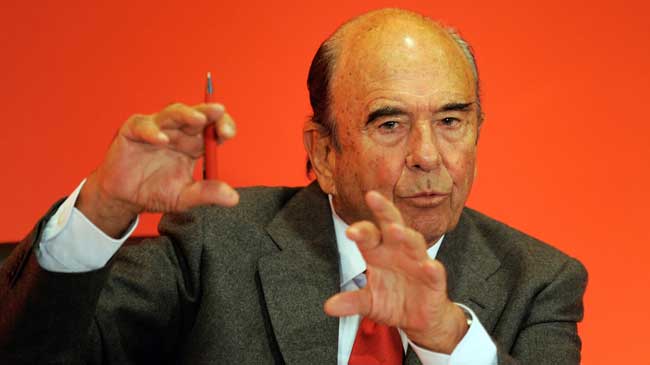
By Julia Pastor, in Madrid | The president of the bank Santander Emilio Botín knows very well what he is talking about, and from where he is talking. He has a privileged position. He leads the most powerful and respected bank, not only in Spain but also in Europe. That is why on Tuesday, during the conference press to render and explain the banks’ last year results, he could afford to detail what some Spanish media outlets have described in today’s edition as ‘his roadmap for Spain’. Botín pointed out that, in his opinion, the country has two main priorities: the banking system restructuring and the labour market reform.
Regarding the financial sector reorganisation, which affects his business more closely, Botín is very sure about that what must be done is what the new ‘and brilliant’ ministry of Economy and Competitivity Luis de Guindos has devised: taking the toxic excess generated by the real state boom out of the entities’ balances once and for all. Emilio Botín is also confident about the period of time that the reorganisation should take: it must not exceed one year term.
Furthermore, Santander’s president demanded his sector colleages to use their own equity capital for cleaning up their balances instead of public aid. According to Botín,
“It is not logical that any entity would be supported against the other ones […] Those non viable entities should be sold,” assured the president. Or, in the words of Wednesday digital press editions: ‘Botín defended that everyone face the music, take responsibility.’”
The Spanish government will pass in the next Council of ministers a rule to force the financial entities to reduce the value given to the assets bound to the real state activities. This measure will involve the banks making an extra effort in provisions. It is taken for granted that Santander, as the other big Spanish entities, BBVA and Caixabank, will manage to meet the demand; however, Bankia, another big name, may have problems to fulfill.
Asked about the financial group headed by Rodrigo Rato, a former minister of Economy in José María Aznar’s times and also a former IMF’s general director, Botín did not doubt either:
“Bankia is a very relevant brand, particularly in Madrid. They are in an adjustment process and I am quite sure it will succeed”.
On the other hand, Santander’s president has no the intention to lead the merger and acquisition process opened right now in the Spanish financial sector, even though he admits their interest on Unnim’s figures, and assures that
“if we start some operation, we will demand all we can and use all we are given.”
In his role of master of Spain’s finances, Botín refused any responsability for his bank on the financial excess of the last decade. His answer was not absolutely categorical, at least he said that it was
“a bit” their fault. “We have paid our taxes and have not had any help. There are banks which have done it badly and then received help at taxpayers expenses,” explained the banker. The mistake, “the very big mistake” has been made by politicians. “They did not managed the crisis well.”
On Wednesday morning, these Botín’s words were replied by the statements of Jesús Terciado, Cepyme’s president (the small and medium companies association), who in a radio interview said that
“banks should accept they are also to blame for the crisis, as all of us are, because of the exccessive risk they took in the real state sector,” although he did agree with Botín’s opinion about the “big” politicians responsibility.
Terciado also took the chance to criticise the banks “ excessive and exhorbitant” demands to give credit to SME, entrepreuners and just individual investors.
During the presentation results, Botín anticipated a response to this question as well. According to him, his
“entity has not cut the credit. We do not lend just because there are no solvent demands.”
For Santander’s president, a financial system
“with larger, more solid and more efficient entities, and a distribution network that fits the true business dimension” will be essential in 2012, a year in which the Spanish economy will go “from less to more,” even though the improvement will not be really noticed up to 2013.
We wish that Mr. Botín were right.





Be the first to comment on "Botín, the master of Spanish finances"